Antitrust and Custom Law EU Antitrust Law



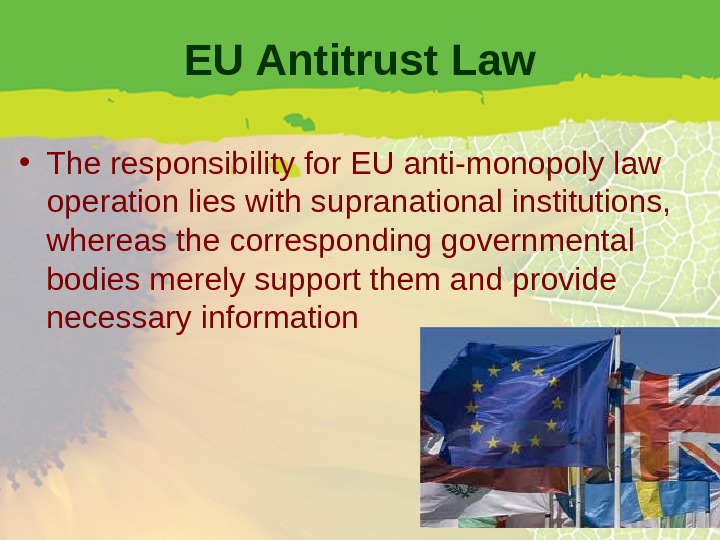


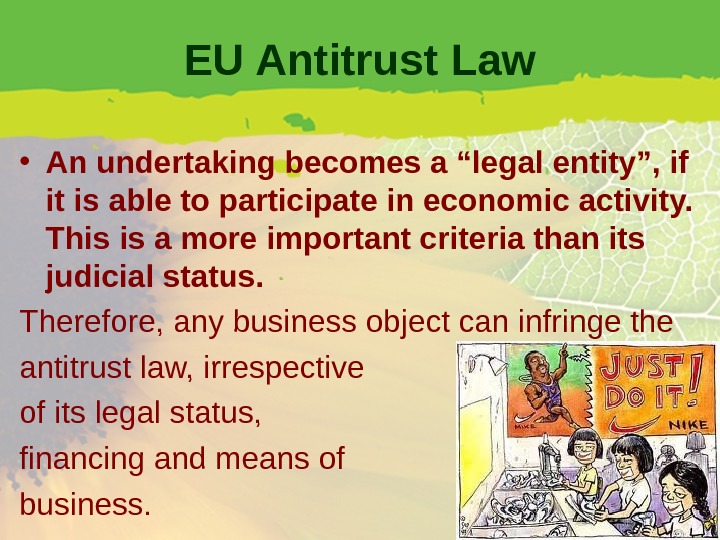






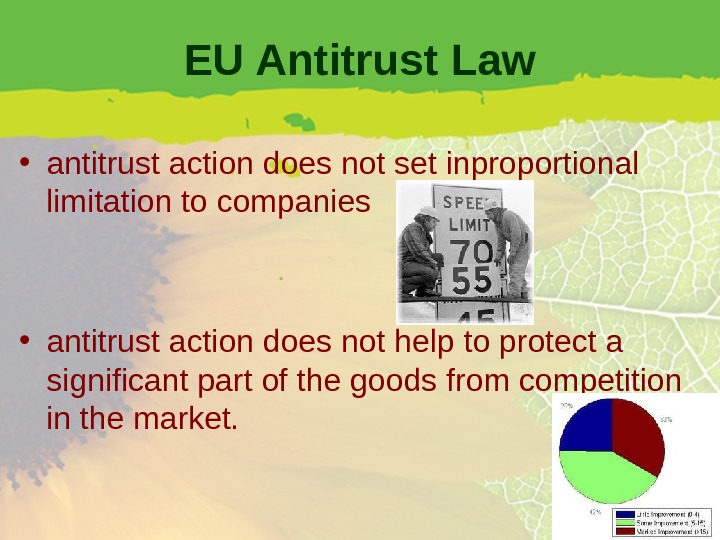

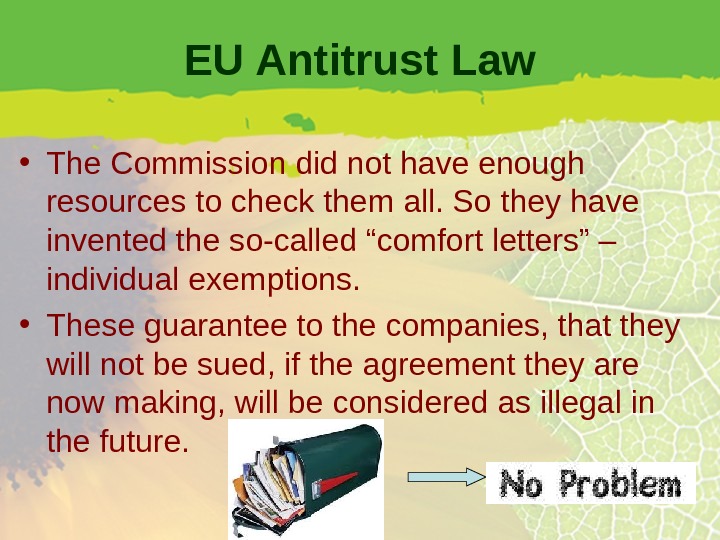



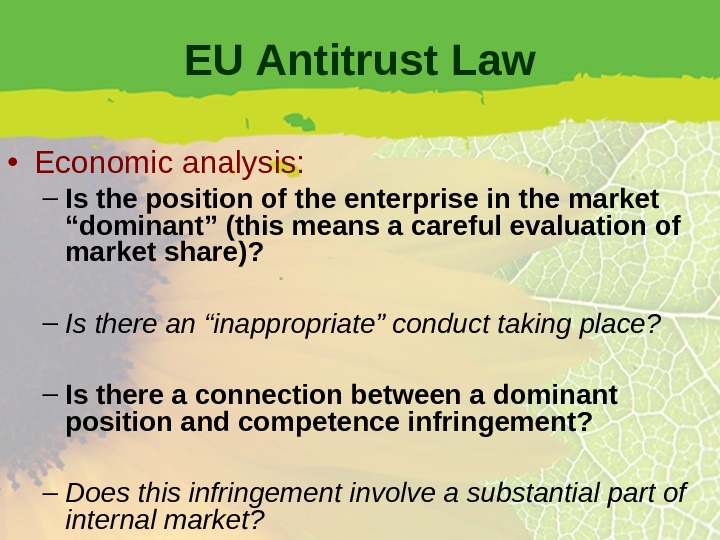









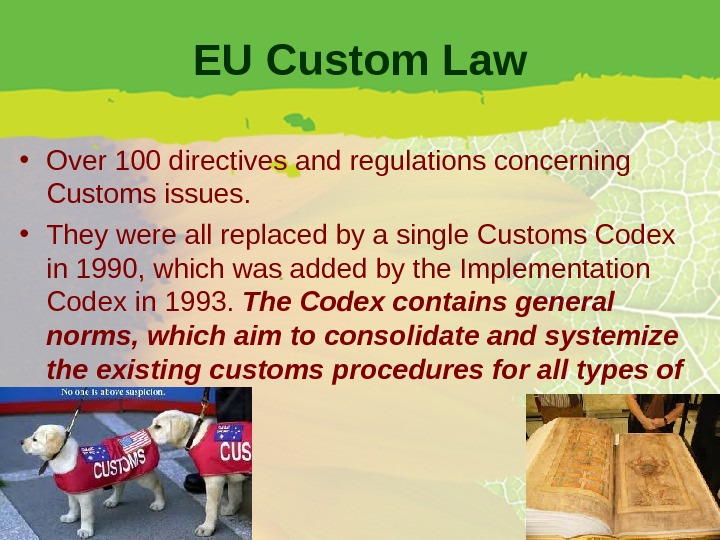
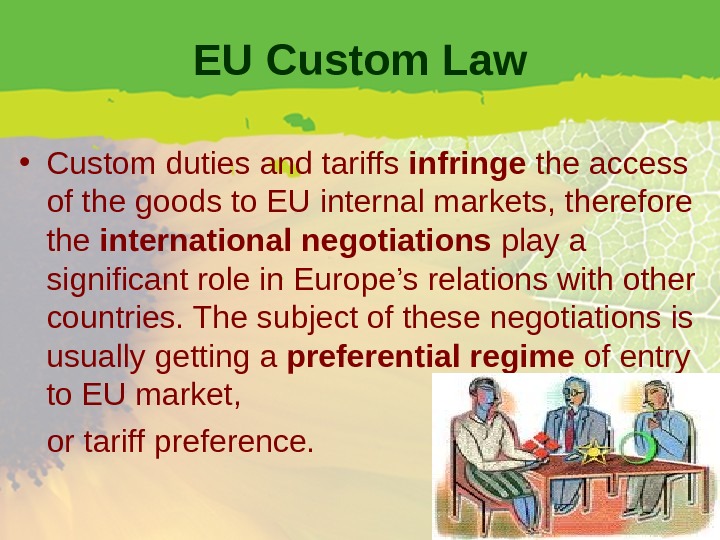

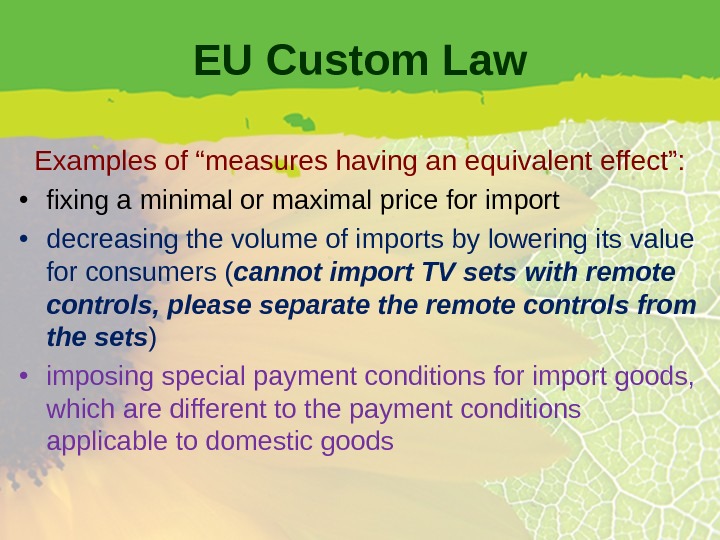
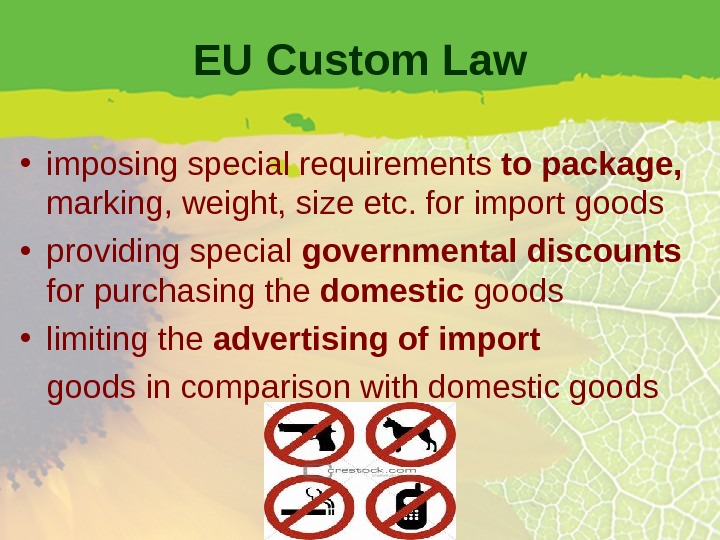
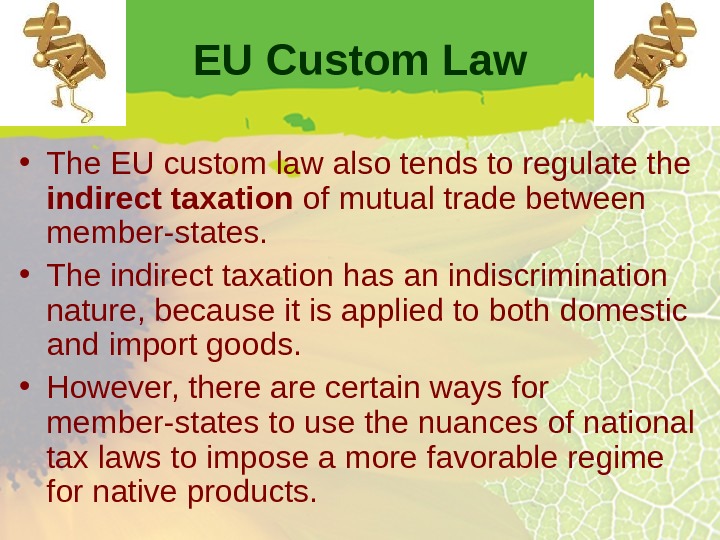

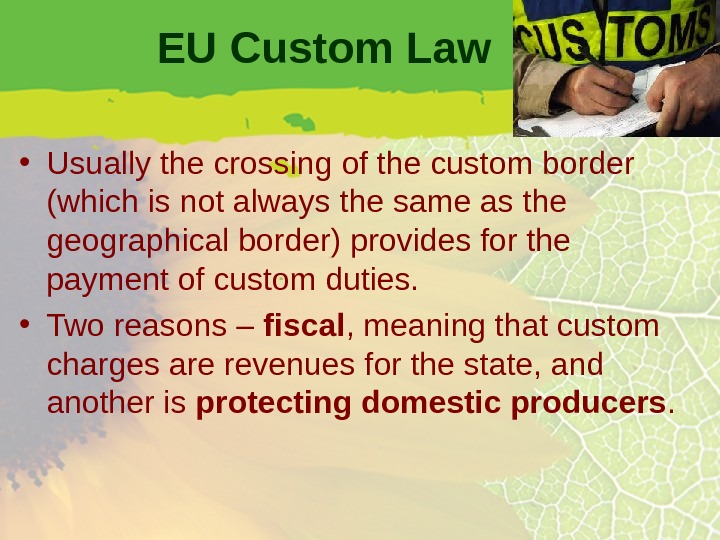
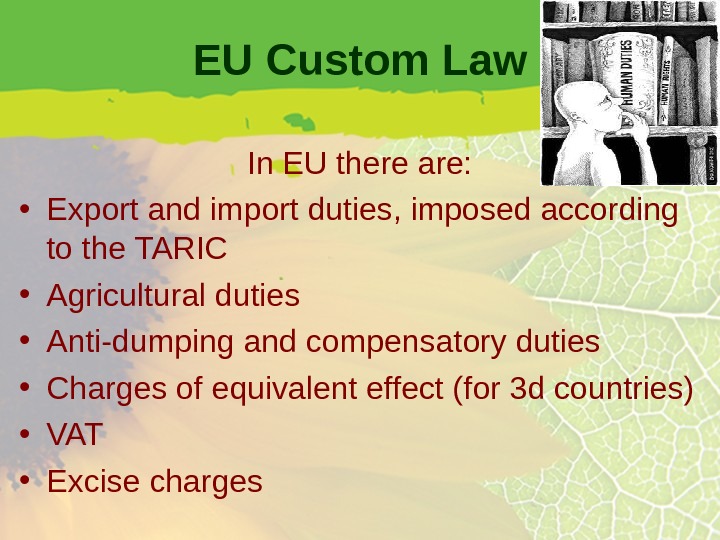
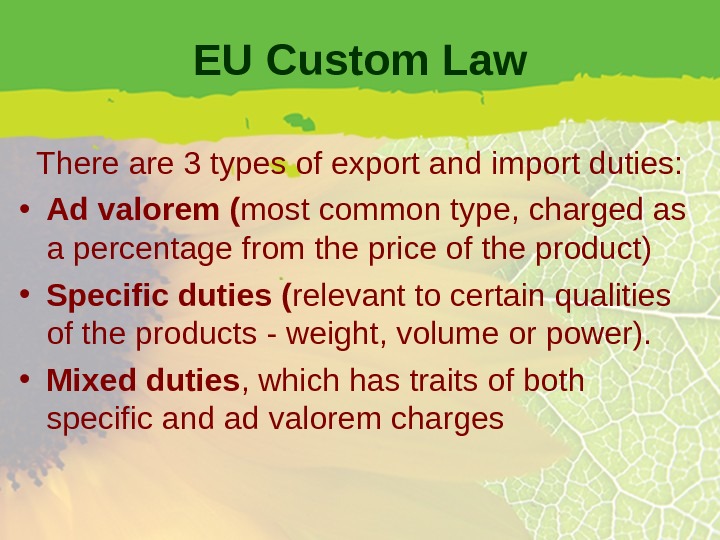
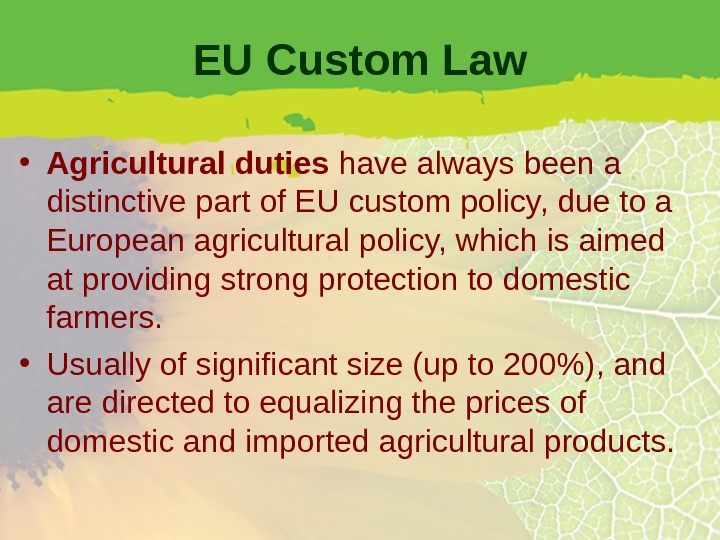


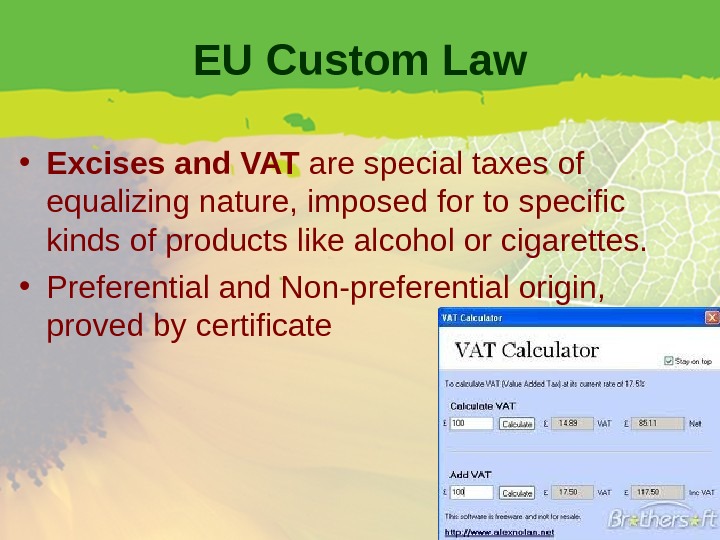




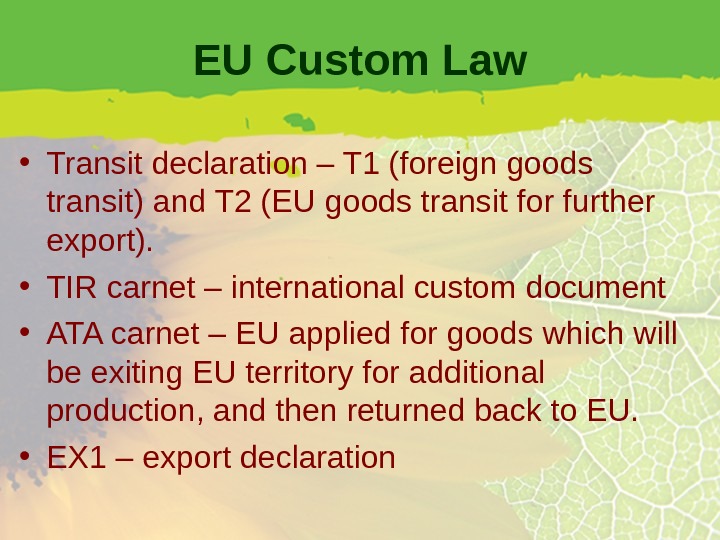

5eu_antitrust_and_customs_law_no_pictures.ppt
- Размер: 1.4 Mегабайта
- Количество слайдов: 48
Описание презентации Antitrust and Custom Law EU Antitrust Law по слайдам
 Antitrust and Custom Law
Antitrust and Custom Law
 EU Antitrust Law • The general idea in the field of EU competition is a movement from the “bad” monopoly market to “good” market of perfect competition.
EU Antitrust Law • The general idea in the field of EU competition is a movement from the “bad” monopoly market to “good” market of perfect competition.
 EU Antitrust Law • The responsibility for EU anti-monopoly law operation lies with supranational institutions, whereas the corresponding governmental bodies merely support them and provide necessary information
EU Antitrust Law • The responsibility for EU anti-monopoly law operation lies with supranational institutions, whereas the corresponding governmental bodies merely support them and provide necessary information
 EU Antitrust Law All the rules are divided into groups of framework : • norms applicable to company mergers (merger regulation); • antitrust norms • norms applicable to governmental help (state aid) • regulation of natural monopolies (transport, communications, energy production).
EU Antitrust Law All the rules are divided into groups of framework : • norms applicable to company mergers (merger regulation); • antitrust norms • norms applicable to governmental help (state aid) • regulation of natural monopolies (transport, communications, energy production).
 EU Antitrust Law • There is no definition of “legal entity” or “undertaking” in the EU constitutive treaties • Undertaking is a complex of human, intellectual and material resource.
EU Antitrust Law • There is no definition of “legal entity” or “undertaking” in the EU constitutive treaties • Undertaking is a complex of human, intellectual and material resource.
 EU Antitrust Law • An undertaking becomes a “legal entity”, if it is able to participate in economic activity. This is a more important criteria than its judicial status. Therefore, any business object can infringe the antitrust law, irrespective of its legal status, financing and means of business.
EU Antitrust Law • An undertaking becomes a “legal entity”, if it is able to participate in economic activity. This is a more important criteria than its judicial status. Therefore, any business object can infringe the antitrust law, irrespective of its legal status, financing and means of business.
 EU Antitrust Law • A “legal entity” should have a legal and economic independence (for the purposes of antitrust law). • Therefore if a branch is in breach of the antimonopoly law, the head company will be sued, even if it is not within the EU.
EU Antitrust Law • A “legal entity” should have a legal and economic independence (for the purposes of antitrust law). • Therefore if a branch is in breach of the antimonopoly law, the head company will be sued, even if it is not within the EU.
 EU Antitrust Law • If the undertaking sued under the antitrust law, and suddenly disappears for some reason (becomes bankrupt), and there is no legal “heir” to its name, the legal action will be brought to the next company, which will use the same resources.
EU Antitrust Law • If the undertaking sued under the antitrust law, and suddenly disappears for some reason (becomes bankrupt), and there is no legal “heir” to its name, the legal action will be brought to the next company, which will use the same resources.
 EU Antitrust Law • The Eurocommission has extremely wide authority in its struggle against competition law infringement by the companies. It has the right to investigate possible breaches both by own initiative and by somebody’s inquiry.
EU Antitrust Law • The Eurocommission has extremely wide authority in its struggle against competition law infringement by the companies. It has the right to investigate possible breaches both by own initiative and by somebody’s inquiry.
 EU Antitrust Law • The undertaking will have to provide all information asked for by Eurocomission officials, and also the access to the company’s premises, and verbal explanations.
EU Antitrust Law • The undertaking will have to provide all information asked for by Eurocomission officials, and also the access to the company’s premises, and verbal explanations.
 EU Antitrust Law • Eurocommission has the right to impose fines for competition infringement, and for non-execution of the lawful requirements of the Eurocommission officials
EU Antitrust Law • Eurocommission has the right to impose fines for competition infringement, and for non-execution of the lawful requirements of the Eurocommission officials
 EU Antitrust Law An antitrust activity can be held legal, if it fits the four criteria (all four of them): • antitrust action is aimed at production enhancement, technical or economic progress, or improvement of goods distribution • antitrust action is providing equal benefits for consumers
EU Antitrust Law An antitrust activity can be held legal, if it fits the four criteria (all four of them): • antitrust action is aimed at production enhancement, technical or economic progress, or improvement of goods distribution • antitrust action is providing equal benefits for consumers
 EU Antitrust Law • antitrust action does not set inproportional limitation to companies • antitrust action does not help to protect a significant part of the goods from competition in the market.
EU Antitrust Law • antitrust action does not set inproportional limitation to companies • antitrust action does not help to protect a significant part of the goods from competition in the market.
 EU Antitrust Law • All the companies making agreements with each other wanted to make sure these documents are legal. So they all sent the drafts to the Eurocomission for checking the compliance to the antitrust law.
EU Antitrust Law • All the companies making agreements with each other wanted to make sure these documents are legal. So they all sent the drafts to the Eurocomission for checking the compliance to the antitrust law.
 EU Antitrust Law • The Commission did not have enough resources to check them all. So they have invented the so-called “comfort letters” – individual exemptions. • These guarantee to the companies, that they will not be sued, if the agreement they are now making, will be considered as illegal in the future.
EU Antitrust Law • The Commission did not have enough resources to check them all. So they have invented the so-called “comfort letters” – individual exemptions. • These guarantee to the companies, that they will not be sued, if the agreement they are now making, will be considered as illegal in the future.
 EU Antitrust Law • There also the Block Excemptions, concerning certain categories of agreements. For example, mutual agreements on exclusive distributorship and exclusive shipments of goods, or franchising. These agreements are generally not aimed at damaging competition, but formally – they are.
EU Antitrust Law • There also the Block Excemptions, concerning certain categories of agreements. For example, mutual agreements on exclusive distributorship and exclusive shipments of goods, or franchising. These agreements are generally not aimed at damaging competition, but formally – they are.
 EU Antitrust Law • There also “black” and “white” lists of provisions within such agreements (franchising, for example). Obviously, a franchising agreement with a “black list” provision within it will be held illegal.
EU Antitrust Law • There also “black” and “white” lists of provisions within such agreements (franchising, for example). Obviously, a franchising agreement with a “black list” provision within it will be held illegal.
 EU Antitrust Law • According to the Antitrust Law, an ability to act on a certain market, without taking notice of the actions of the competitors, provides a possibility to infringe the competition. This ability is called a Dominant Position.
EU Antitrust Law • According to the Antitrust Law, an ability to act on a certain market, without taking notice of the actions of the competitors, provides a possibility to infringe the competition. This ability is called a Dominant Position.
 EU Antitrust Law • Economic analysis: – Is the position of the enterprise in the market “dominant” (this means a careful evaluation of market share)? – Is there an “inappropriate” conduct taking place? – Is there a connection between a dominant position and competence infringement? – Does this infringement involve a substantial part of internal market?
EU Antitrust Law • Economic analysis: – Is the position of the enterprise in the market “dominant” (this means a careful evaluation of market share)? – Is there an “inappropriate” conduct taking place? – Is there a connection between a dominant position and competence infringement? – Does this infringement involve a substantial part of internal market?
 EU Antitrust Law • The Dominant Position is not itself prohibited in EU law (it would be impossible within today’s market economy). Only the misusage of company’s Dominant Position is prohibited.
EU Antitrust Law • The Dominant Position is not itself prohibited in EU law (it would be impossible within today’s market economy). Only the misusage of company’s Dominant Position is prohibited.
 EU Antitrust Law • If several large companies join into one, a danger for competition occurs. That is why there is also a merger control.
EU Antitrust Law • If several large companies join into one, a danger for competition occurs. That is why there is also a merger control.
 EU Antitrust Law Not each merger is of interest for Eurocomission. The criteria are : • 5 billion euro annual turnover in the global market of all the “mergerers”; • At least two of the merging companies should have over 250 million euro annual turnover at the internal market.
EU Antitrust Law Not each merger is of interest for Eurocomission. The criteria are : • 5 billion euro annual turnover in the global market of all the “mergerers”; • At least two of the merging companies should have over 250 million euro annual turnover at the internal market.
 EU Antitrust Law • All merger plans are provided to the Eurocomission, and then one of 3 decisions are made – it’s ok \ it’s not ok at all \ it would be ok, if you make the following changes.
EU Antitrust Law • All merger plans are provided to the Eurocomission, and then one of 3 decisions are made – it’s ok \ it’s not ok at all \ it would be ok, if you make the following changes.
 EU Antitrust Law • Leniency policy provides immunity and fine reduction to the companies, who inform the authorities about an illegal antitrust agreement they are taking part in.
EU Antitrust Law • Leniency policy provides immunity and fine reduction to the companies, who inform the authorities about an illegal antitrust agreement they are taking part in.
 EU Antitrust Law • The first one who rushes to the office of the Eurocommission, and gives himself in – receives the complete immunity. The next ones – 50% reduction. If the company is caught within a cartel or antitrust agreement, it can decrease its fines by 20 -30% by providing some valuable information on details of the agreement.
EU Antitrust Law • The first one who rushes to the office of the Eurocommission, and gives himself in – receives the complete immunity. The next ones – 50% reduction. If the company is caught within a cartel or antitrust agreement, it can decrease its fines by 20 -30% by providing some valuable information on details of the agreement.
 EU Antitrust Law • This policy was so successful, that nowadays almost 80% of all Eurocommission antitrust investigations start this way.
EU Antitrust Law • This policy was so successful, that nowadays almost 80% of all Eurocommission antitrust investigations start this way.
 EU Custom Law • Generally, any custom law is a set of laws, governing legal relationship concerning the passage of the goods through custom border, institutional organization of customs and punishment for breach of custom regulations.
EU Custom Law • Generally, any custom law is a set of laws, governing legal relationship concerning the passage of the goods through custom border, institutional organization of customs and punishment for breach of custom regulations.
 EU Custom Law • Most of EU custom law is supervised by the supranational institutions. However, there are many issues, which are still governed on a national level, for example, the institutional foundation of customs service, its structure and the status of customs officers.
EU Custom Law • Most of EU custom law is supervised by the supranational institutions. However, there are many issues, which are still governed on a national level, for example, the institutional foundation of customs service, its structure and the status of customs officers.
 EU Custom Law • Over 100 directives and regulations concerning Customs issues. • They were all replaced by a single Customs Codex in 1990, which was added by the Implementation Codex in 1993. The Codex contains general norms, which aim to consolidate and systemize the existing customs procedures for all types of goods.
EU Custom Law • Over 100 directives and regulations concerning Customs issues. • They were all replaced by a single Customs Codex in 1990, which was added by the Implementation Codex in 1993. The Codex contains general norms, which aim to consolidate and systemize the existing customs procedures for all types of goods.
 EU Custom Law • Custom duties and tariffs infringe the access of the goods to EU internal markets, therefore the international negotiations play a significant role in Europe’s relations with other countries. The subject of these negotiations is usually getting a preferential regime of entry to EU market, or tariff preference.
EU Custom Law • Custom duties and tariffs infringe the access of the goods to EU internal markets, therefore the international negotiations play a significant role in Europe’s relations with other countries. The subject of these negotiations is usually getting a preferential regime of entry to EU market, or tariff preference.
 EU Custom Law • The custom union is a foundation of EU, and provides the cancellation of all internal custom duties and other measures having an equivalent effect, as well as imposition of Common custom tariff for goods deriving from the third countries.
EU Custom Law • The custom union is a foundation of EU, and provides the cancellation of all internal custom duties and other measures having an equivalent effect, as well as imposition of Common custom tariff for goods deriving from the third countries.
 EU Custom Law Examples of “measures having an equivalent effect”: • fixing a minimal or maximal price for import • decreasing the volume of imports by lowering its value for consumers ( cannot import TV sets with remote controls, please separate the remote controls from the sets ) • imposing special payment conditions for import goods, which are different to the payment conditions applicable to domestic goods
EU Custom Law Examples of “measures having an equivalent effect”: • fixing a minimal or maximal price for import • decreasing the volume of imports by lowering its value for consumers ( cannot import TV sets with remote controls, please separate the remote controls from the sets ) • imposing special payment conditions for import goods, which are different to the payment conditions applicable to domestic goods
 EU Custom Law • imposing special requirements to package, marking, weight, size etc. for import goods • providing special governmental discounts for purchasing the domestic goods • limiting the advertising of import goods in comparison with domestic goods
EU Custom Law • imposing special requirements to package, marking, weight, size etc. for import goods • providing special governmental discounts for purchasing the domestic goods • limiting the advertising of import goods in comparison with domestic goods
 EU Custom Law • The EU custom law also tends to regulate the indirect taxation of mutual trade between member-states. • The indirect taxation has an indiscrimination nature, because it is applied to both domestic and import goods. • However, there are certain ways for member-states to use the nuances of national tax laws to impose a more favorable regime for native products.
EU Custom Law • The EU custom law also tends to regulate the indirect taxation of mutual trade between member-states. • The indirect taxation has an indiscrimination nature, because it is applied to both domestic and import goods. • However, there are certain ways for member-states to use the nuances of national tax laws to impose a more favorable regime for native products.
 EU Custom Law • One of the main features of European Custom Union is the Common tariff. • Like any other tariff, it is based on a listing of goods. At first the Brussels listing was used as a basis, then it was revised into a Harmonized listing, and afterwards it was transformed into an Integrated tariff (TARIC). • 11 languages • Different figures
EU Custom Law • One of the main features of European Custom Union is the Common tariff. • Like any other tariff, it is based on a listing of goods. At first the Brussels listing was used as a basis, then it was revised into a Harmonized listing, and afterwards it was transformed into an Integrated tariff (TARIC). • 11 languages • Different figures
 EU Custom Law • Usually the crossing of the custom border (which is not always the same as the geographical border) provides for the payment of custom duties. • Two reasons – fiscal , meaning that custom charges are revenues for the state, and another is protecting domestic producers.
EU Custom Law • Usually the crossing of the custom border (which is not always the same as the geographical border) provides for the payment of custom duties. • Two reasons – fiscal , meaning that custom charges are revenues for the state, and another is protecting domestic producers.
 EU Custom Law In EU there are: • Export and import duties, imposed according to the TARIC • Agricultural duties • Anti-dumping and compensatory duties • Charges of equivalent effect (for 3 d countries) • VAT • Excise charges
EU Custom Law In EU there are: • Export and import duties, imposed according to the TARIC • Agricultural duties • Anti-dumping and compensatory duties • Charges of equivalent effect (for 3 d countries) • VAT • Excise charges
 EU Custom Law There are 3 types of export and import duties: • Ad valorem ( most common type, charged as a percentage from the price of the product) • Specific duties ( relevant to certain qualities of the products — weight, volume or power). • Mixed duties , which has traits of both specific and ad valorem charges
EU Custom Law There are 3 types of export and import duties: • Ad valorem ( most common type, charged as a percentage from the price of the product) • Specific duties ( relevant to certain qualities of the products — weight, volume or power). • Mixed duties , which has traits of both specific and ad valorem charges
 EU Custom Law • Agricultural duties have always been a distinctive part of EU custom policy, due to a European agricultural policy, which is aimed at providing strong protection to domestic farmers. • Usually of significant size (up to 200%), and are directed to equalizing the prices of domestic and imported agricultural products.
EU Custom Law • Agricultural duties have always been a distinctive part of EU custom policy, due to a European agricultural policy, which is aimed at providing strong protection to domestic farmers. • Usually of significant size (up to 200%), and are directed to equalizing the prices of domestic and imported agricultural products.
 EU Custom Law • Seasonal charges are a specific kind of agricultural duties, and are imposed only for a certain period of time (for example, there is a special seasonal charge, which is active from mid-May to end-June).
EU Custom Law • Seasonal charges are a specific kind of agricultural duties, and are imposed only for a certain period of time (for example, there is a special seasonal charge, which is active from mid-May to end-June).
 EU Custom Law • The anti-dumping duties are imposed in cases of significant export support in a 3 d country or in case of extremely low export prices for certain products. • For example, if a dvd player in China costs 20 Eur for domestic consumers, and the export price to EU for it is 5 Eur – an anti-dumping duty will probably be imposed).
EU Custom Law • The anti-dumping duties are imposed in cases of significant export support in a 3 d country or in case of extremely low export prices for certain products. • For example, if a dvd player in China costs 20 Eur for domestic consumers, and the export price to EU for it is 5 Eur – an anti-dumping duty will probably be imposed).
 EU Custom Law • Excises and VAT are special taxes of equalizing nature, imposed for to specific kinds of products like alcohol or cigarettes. • Preferential and Non-preferential origin, proved by certificate
EU Custom Law • Excises and VAT are special taxes of equalizing nature, imposed for to specific kinds of products like alcohol or cigarettes. • Preferential and Non-preferential origin, proved by certificate
 EU Custom Law EU custom law also allows member-states to impose additional charges for the provision of extra services, such as : • Expert evaluation of product samples • Longer period of storage of goods at custom warehouse • Importer verifications of goods before submission of custom declaration • The destruction of products • Custom clearance outside the designated areas
EU Custom Law EU custom law also allows member-states to impose additional charges for the provision of extra services, such as : • Expert evaluation of product samples • Longer period of storage of goods at custom warehouse • Importer verifications of goods before submission of custom declaration • The destruction of products • Custom clearance outside the designated areas
 EU Custom Law • EU Import charges are based on the price of a deal. • However, it should also include some payments besides the actual payable price: – Broker charges and commissions – Additional packing and containers – Extra expenses: goods and services provided together with the imported products – License charges (patents, know-how, etc) – Transport, loading and unloading, before reaching the territory of EU (CIF price basis)
EU Custom Law • EU Import charges are based on the price of a deal. • However, it should also include some payments besides the actual payable price: – Broker charges and commissions – Additional packing and containers – Extra expenses: goods and services provided together with the imported products – License charges (patents, know-how, etc) – Transport, loading and unloading, before reaching the territory of EU (CIF price basis)
 EU Custom Law • If the prices cannot be determined, there are 4 more methods available: – Identical goods (same country and characteristic) – Similar goods (same country) – Estimated costs – Deductive method (other country, but same item)
EU Custom Law • If the prices cannot be determined, there are 4 more methods available: – Identical goods (same country and characteristic) – Similar goods (same country) – Estimated costs – Deductive method (other country, but same item)
 EU Custom Law • All goods should be declared with a EU customs declaration, which is called SAD – Single Administrative Document. • It can be done in both paper and via EDI — Electronic Data Interchange.
EU Custom Law • All goods should be declared with a EU customs declaration, which is called SAD – Single Administrative Document. • It can be done in both paper and via EDI — Electronic Data Interchange.
 EU Custom Law • Transit declaration – T 1 (foreign goods transit) and T 2 (EU goods transit for further export). • TIR carnet – international custom document • ATA carnet – EU applied for goods which will be exiting EU territory for additional production, and then returned back to EU. • EX 1 – export declaration
EU Custom Law • Transit declaration – T 1 (foreign goods transit) and T 2 (EU goods transit for further export). • TIR carnet – international custom document • ATA carnet – EU applied for goods which will be exiting EU territory for additional production, and then returned back to EU. • EX 1 – export declaration
 Thank you for your attention
Thank you for your attention

